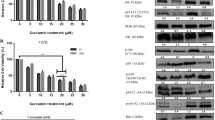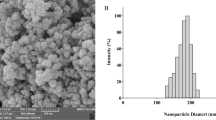Abstract
Curcumin is assumed to be a plant-derived therapeutic drug that triggers apoptotic cell death in vitro and in vivo by affecting different molecular targets such as NF-κB. Phase I/II trial of curcumin alone or with chemotherapeutic drugs has been accomplished in pancreatic, colon, prostate and breast cancer cases. Recently, autocrine growth hormone (GH) signaling-induced cell growth, metastasis and drug resistance have been demonstrated in breast cancer. In this study, our aim was to investigate the potential therapeutic effect of curcumin by evaluating the molecular machinery of curcumin-triggered apoptotic cell death via focusing on NF-κB signaling and polyamine (PA) metabolism in autocrine GH-expressing MCF-7, MDA-MB-453 and MDA-MB-231 breast cancer cells. For this purpose, a pcDNA3.1 (+) vector with a GH gene insert was transfected by a liposomal agent in all breast cancer cells and then selection was conducted in neomycin (G418) included media. Autocrine GH-induced curcumin resistance was overcome in a dose-dependent manner and curcumin inhibited cell proliferation, invasion–metastasis and phosphorylation of p65 (Ser536), and thereby partly prevented its DNA binding activity in breast cancer cells. Moreover, curcumin induced caspase-mediated apoptotic cell death by activating the PA catabolic enzyme expressions, which led to generation of toxic by-products such as H2O2 in MCF-7, MDA-MB-453 and MDA-MB-231 GH+ breast cancer cells. In addition, transient silencing of SSAT prevented curcumin-induced cell viability loss and apoptotic cell death in each breast cancer cells. In conclusion, curcumin could overcome the GH-mediated resistant phenotype via modulating cell survival, death-related signaling routes and activating PA catabolic pathway.














Similar content being viewed by others
References
Arisan ED, Obakan P, Coker-Gurkan A, Calcabrini A, Agostinelli E, Unsal NP (2014) CDK inhibitors induce mitochondria-mediated apoptosis through the activation of polyamine catabolic pathway in LNCaP, DU145 and PC3 prostate cancer cells. Curr Pharm Des 20:180–188
Bahadori F, Demiray M (2017) A realistic view on “The essential medicinal chemistry of curcumin”. ACS Med Chem Lett 8:893–896. https://doi.org/10.1021/acsmedchemlett.7b00284
Battaglia V, Shields CD, Murray-Stewart T, Casero RA Jr (2014) Polyamine catabolism in carcinogenesis: potential targets for chemotherapy and chemoprevention. Amino Acids 46:511–519. https://doi.org/10.1007/s00726-013-1529-6
Bayet-Robert M et al (2010) Phase I dose escalation trial of docetaxel plus curcumin in patients with advanced and metastatic breast cancer. Cancer Biol Ther 9:8–14
Berrak O, Akkoc Y, Arisan ED, Coker-Gurkan A, Obakan-Yerlikaya P, Palavan-Unsal N (2016) The inhibition of PI3K and NF-κB promoted curcumin-induced cell cycle arrest at G2/M via altering polyamine metabolism in Bcl-2 overexpressing MCF-7 breast cancer cells. Biomed Pharmacother 77:150–160. https://doi.org/10.1016/j.biopha.2015.12.007
Birzniece V, Sata A, Ho KK (2009) Growth hormone receptor modulators. Rev Endocr Metab Disord 10:145–156. https://doi.org/10.1007/s11154-008-9089-x
Bougen NM, Yang T, Chen H, Lobie PE, Perry JK (2011) Autocrine human growth hormone reduces mammary and endometrial carcinoma cell sensitivity to mitomycin C. Oncol Rep 26:487–493. https://doi.org/10.3892/or.2011.1305
Bougen NM et al (2012) Autocrine human GH promotes radioresistance in mammary and endometrial carcinoma cells. Endocr Relat Cancer 19:625–644. https://doi.org/10.1530/ERC-12-0042
Brunet-Dunand SE et al (2009) Autocrine human growth hormone promotes tumor angiogenesis in mammary carcinoma. Endocrinology 150:1341–1352. https://doi.org/10.1210/en.2008-0608
Chauhan DP (2002) Chemotherapeutic potential of curcumin for colorectal cancer. Curr Pharm Des 8:1695–1706
Chen YJ, Zhang X, Wu ZS, Wang JJ, Lau AY, Zhu T, Lobie PE (2015) Autocrine human growth hormone stimulates the tumor initiating capacity and metastasis of estrogen receptor-negative mammary carcinoma cells. Cancer Lett 365:182–189. https://doi.org/10.1016/j.canlet.2015.05.031
Cohen SS (1978) What do the polyamines do? Nature 274:209–210
Coskun D, Obakan P, Arisan ED, Coker-Gurkan A, Palavan-Unsal N (2015) Epibrassinolide alters PI3K/MAPK signaling axis via activating Foxo3a-induced mitochondria-mediated apoptosis in colon cancer cells. Exp Cell Res 338:10–21. https://doi.org/10.1016/j.yexcr.2015.08.015
Dhillon N et al (2008) Phase II trial of curcumin in patients with advanced pancreatic cancer. Clin Cancer Res 14:4491–4499. https://doi.org/10.1158/1078-0432.CCR-08-0024
Duvoix A et al (2005) Chemopreventive and therapeutic effects of curcumin. Cancer Lett 223:181–190. https://doi.org/10.1016/j.canlet.2004.09.041
Guo H, Xu YM, Ye ZQ, Yu JH, Hu XY (2013) Curcumin induces cell cycle arrest and apoptosis of prostate cancer cells by regulating the expression of IkappaBalpha, c-Jun and androgen receptor. Pharmazie 68:431–434
Gurkan AC, Arisan ED, Obakan P, Palavan-Unsal N (2013) Inhibition of polyamine oxidase prevented cyclin-dependent kinase inhibitor-induced apoptosis in HCT 116 colon carcinoma cells. Apoptosis 18:1536–1547. https://doi.org/10.1007/s10495-013-0885-8
Hajra KM, Chen DY, Fearon ER (2002) The SLUG zinc-finger protein represses E-cadherin in breast cancer. Cancer Res 62:1613–1618
Hazan RB, Phillips GR, Qiao RF, Norton L, Aaronson SA (2000) Exogenous expression of N-cadherin in breast cancer cells induces cell migration, invasion, and metastasis. J Cell Biol 148:779–790
Hodge C, Liao J, Stofega M, Guan K, Carter-Su C, Schwartz J (1998) Growth hormone stimulates phosphorylation and activation of elk-1 and expression of c-fos, egr-1, and junB through activation of extracellular signal-regulated kinases 1 and 2. J Biol Chem 273:31327–31336
Igarashi K, Kashiwagi K (2000) Polyamines: mysterious modulators of cellular functions. Biochem Biophys Res Commun 271:559–564. https://doi.org/10.1006/bbrc.2000.2601
Kanai M et al (2011) A phase I/II study of gemcitabine-based chemotherapy plus curcumin for patients with gemcitabine-resistant pancreatic cancer. Cancer Chemother Pharmacol 68:157–164. https://doi.org/10.1007/s00280-010-1470-2
Kaulsay KK, Mertani HC, Tornell J, Morel G, Lee KO, Lobie PE (1999) Autocrine stimulation of human mammary carcinoma cell proliferation by human growth hormone. Exp Cell Res 250:35–50. https://doi.org/10.1006/excr.1999.4492
Kaulsay KK, Mertani HC, Lee KO, Lobie PE (2000) Autocrine human growth hormone enhancement of human mammary carcinoma cell spreading is Jak2 dependent. Endocrinology 141:1571–1584. https://doi.org/10.1210/endo.141.4.7426
Kaulsay KK, Zhu T, Bennett W, Lee KO, Lobie PE (2001) The effects of autocrine human growth hormone (hGH) on human mammary carcinoma cell behavior are mediated via the hGH receptor. Endocrinology 142:767–777. https://doi.org/10.1210/endo.142.2.7936
Ke CS, Liu HS, Yen CH, Huang GC, Cheng HC, Huang CY, Su CL (2014) Curcumin-induced Aurora-A suppression not only causes mitotic defect and cell cycle arrest but also alters chemosensitivity to anticancer drugs. J Nutr Biochem 25:526–539. https://doi.org/10.1016/j.jnutbio.2014.01.003
Lanning NJ, Carter-Su C (2006) Recent advances in growth hormone signaling. Rev Endocr Metab Disord 7:225–235. https://doi.org/10.1007/s11154-007-9025-5
Liao YF, Hung HC, Hour TC, Hsu PC, Kao MC, Tsay GJ, Liu GY (2008) Curcumin induces apoptosis through an ornithine decarboxylase-dependent pathway in human promyelocytic leukemia HL-60 cells. Life Sci 82:367–375. https://doi.org/10.1016/j.lfs.2007.11.022
Liu Q, Loo WT, Sze SC, Tong Y (2009) Curcumin inhibits cell proliferation of MDA-MB-231 and BT-483 breast cancer cells mediated by down-regulation of NFkappaB, cyclinD and MMP-1 transcription. Phytomedicine 16:916–922. https://doi.org/10.1016/j.phymed.2009.04.008
Marin YE et al (2007) Curcumin downregulates the constitutive activity of NF-kappaB and induces apoptosis in novel mouse melanoma cells. Melanoma Res 17:274–283. https://doi.org/10.1097/CMR.0b013e3282ed3d0e
Miller SA, Dykes DD, Polesky HF (1988) A simple salting out procedure for extracting DNA from human nucleated cells. Nucleic Acids Res 16:1215
Minoia M et al (2012) Growth hormone receptor blockade inhibits growth hormone-induced chemoresistance by restoring cytotoxic-induced apoptosis in breast cancer cells independently of estrogen receptor expression. J Clin Endocrinol Metab 97:E907–E916. https://doi.org/10.1210/jc.2011-3340
Mojarrad M et al (2010) Autocrine human growth hormone expression leads to resistance of MCF-7 cells to tamoxifen. Med Oncol 27:474–480. https://doi.org/10.1007/s12032-009-9237-5
Mol JA, Henzen-Logmans SC, Hageman P, Misdorp W, Blankenstein MA, Rijnberk A (1995) Expression of the gene encoding growth hormone in the human mammary gland. J Clin Endocrinol Metab 80:3094–3096. https://doi.org/10.1210/jcem.80.10.7559904
Moller C, Hansson A, Enberg B, Lobie PE, Norstedt G (1992) Growth hormone (GH) induction of tyrosine phosphorylation and activation of mitogen-activated protein kinases in cells transfected with rat GH receptor cDNA. J Biol Chem 267:23403–23408
Mukhina S, Mertani HC, Guo K, Lee KO, Gluckman PD, Lobie PE (2004) Phenotypic conversion of human mammary carcinoma cells by autocrine human growth hormone. Proc Natl Acad Sci USA 101:15166–15171. https://doi.org/10.1073/pnas.0405881101
Nelson KM, Dahlin JL, Bisson J, Graham J, Pauli GF, Walters MA (2017) The essential medicinal chemistry of curcumin. J Med Chem 60:1620–1637. https://doi.org/10.1021/acs.jmedchem.6b00975
Nollet F, Berx G, van Roy F (1999) The role of the E-cadherin/catenin adhesion complex in the development and progression of cancer. Mol Cell Biol Res Commun 2:77–85. https://doi.org/10.1006/mcbr.1999.0155
Obakan P, Arisan ED, Calcabrini A, Agostinelli E, Bolkent S, Palavan-Unsal N (2014) Activation of polyamine catabolic enzymes involved in diverse responses against epibrassinolide-induced apoptosis in LNCaP and DU145 prostate cancer cell lines. Amino Acids 46:553–564. https://doi.org/10.1007/s00726-013-1574-1
Pegg AE (1988) Polyamine metabolism and its importance in neoplastic growth and a target for chemotherapy. Cancer Res 48:759–774
Perkins ND (2007) Integrating cell-signaling pathways with NF-kappaB and IKK function. Nat Rev Mol Cell Biol 8:49–62. https://doi.org/10.1038/nrm2083
Raccurt M, Lobie PE, Moudilou E, Garcia-Caballero T, Frappart L, Morel G, Mertani HC (2002) High stromal and epithelial human gh gene expression is associated with proliferative disorders of the mammary gland. J Endocrinol 175:307–318
Reuter S, Eifes S, Dicato M, Aggarwal BB, Diederich M (2008) Modulation of anti-apoptotic and survival pathways by curcumin as a strategy to induce apoptosis in cancer cells. Biochem Pharmacol 76:1340–1351. https://doi.org/10.1016/j.bcp.2008.07.031
Sharma RA et al (2004) Phase I clinical trial of oral curcumin: biomarkers of systemic activity and compliance. Clin Cancer Res 10:6847–6854. https://doi.org/10.1158/1078-0432.CCR-04-0744
Shishodia S, Potdar P, Gairola CG, Aggarwal BB (2003) Curcumin (diferuloylmethane) down-regulates cigarette smoke-induced NF-kappaB activation through inhibition of IkappaBalpha kinase in human lung epithelial cells: correlation with suppression of COX-2, MMP-9 and cyclin D1. Carcinogenesis 24:1269–1279. https://doi.org/10.1093/carcin/bgg078
Siegel R et al (2012) Cancer treatment and survivorship statistics. CA Cancer J Clin 62:220–241. https://doi.org/10.3322/caac.21149
Somasundaram S, Edmund NA, Moore DT, Small GW, Shi YY, Orlowski RZ (2002) Dietary curcumin inhibits chemotherapy-induced apoptosis in models of human breast cancer. Cancer Res 62:3868–3875
Sternlicht MD (2006) Key stages in mammary gland development: the cues that regulate ductal branching morphogenesis. Breast Cancer Res 8:201. https://doi.org/10.1186/bcr1368
Winston LA, Bertics PJ (1992) Growth hormone stimulates the tyrosine phosphorylation of 42- and 45-kDa ERK-related proteins. J Biol Chem 267:4747–4751
Wu ZS et al (2011) Tumor expression of human growth hormone and human prolactin predict a worse survival outcome in patients with mammary or endometrial carcinoma. J Clin Endocrinol Metab 96:E1619–E1629. https://doi.org/10.1210/jc.2011-1245
Zatelli MC et al (2009) Growth hormone excess promotes breast cancer chemoresistance. J Clin Endocrinol Metab 94:3931–3938. https://doi.org/10.1210/jc.2009-1026
Zekri A, Ghaffari SH, Yousefi M, Ghanizadeh-Vesali S, Mojarrad M, Alimoghaddam K, Ghavamzadeh A (2013) Autocrine human growth hormone increases sensitivity of mammary carcinoma cell to arsenic trioxide-induced apoptosis. Mol Cell Endocrinol 377:84–92. https://doi.org/10.1016/j.mce.2013.07.002
Zhu T, Goh EL, Lobie PE (1998) Growth hormone stimulates the tyrosine phosphorylation and association of p125 focal adhesion kinase (FAK) with JAK2. Fak is not required for stat-mediated transcription. J Biol Chem 273:10682–10689
Zhu T, Starling-Emerald B, Zhang X, Lee KO, Gluckman PD, Mertani HC, Lobie PE (2005a) Oncogenic transformation of human mammary epithelial cells by autocrine human growth hormone. Cancer Res 65:317–324
Zhu Z, Mukhina S, Zhu T, Mertani HC, Lee KO, Lobie PE (2005b) p44/42 MAP kinase-dependent regulation of catalase by autocrine human growth hormone protects human mammary carcinoma cells from oxidative stress-induced apoptosis. Oncogene 24:3774–3785. https://doi.org/10.1038/sj.onc.1208541
Acknowledgements
The authors wish to thank Furkan Kaysın and Derya Bulut for their technical support.
Funding
This work was supported by the TUBITAK Scientific Projects Support Center (TUBITAK-1001 Program; Grant Number: 113Z791, 2014-2017).
Author information
Authors and Affiliations
Corresponding author
Ethics declarations
Conflict of interest
The authors declare that they have no conflict of interest.
Ethical statement
This article does not involve any studies with animals performed by any of the authors. The research has been performed on commercially available cell lines. Ethical approval for GH cloning experiment was obtained from the Marmara University Medical Faculty and Research Ethics Committee.
Additional information
Handling Editor: E. Agostinelli.
Rights and permissions
About this article
Cite this article
Coker-Gurkan, A., Celik, M., Ugur, M. et al. Curcumin inhibits autocrine growth hormone-mediated invasion and metastasis by targeting NF-κB signaling and polyamine metabolism in breast cancer cells. Amino Acids 50, 1045–1069 (2018). https://doi.org/10.1007/s00726-018-2581-z
Received:
Accepted:
Published:
Issue Date:
DOI: https://doi.org/10.1007/s00726-018-2581-z




